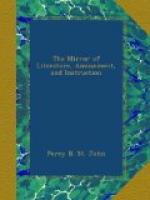ten years, her beauty had attracted too much notice,
and nothing but a lettre de cachet could secure
her from the persecutions of an exalted personage,
she exchanged a convent for a prison. The revolution
set Aline at liberty. At the time of the Egyptian
campaign, the man who was destined to rule France,
and almost all Europe, and who had probably thus early
turned his attention to India, is said to have thought
of the heiress of Tamerlane, and to have formed the
plan of restoring the illustrious stranger to her
native land. Josephine interested herself on this
occasion for the Sultana; but this had no influence
upon her condition. Unhappy, surrounded only
by a few pious nuns, and urged by her confessor, she
renounced the religion of Mahomet, and became a Christian.
At length, in December, 1818, an Indian Sheik, named
Goolam, arrived in Paris, with instructions to claim
the Princess Aline from the Court of France.
The Envoy sought out the Sultana: he informed
her, that her relations were desirous of her return;
that she should be reinstated in the rank which was
her right, and again behold the bright sun and the
beautiful face of her own Asia, upon the sole condition
that she would forsake Christ for Mahomet. No
persuasions, however, could prevail upon the convert
to comply with this requisition; Goolam went back to
India without accomplishing the object of his mission,
which produced no improvement in her straitened circumstances.
Two years afterwards, she learned that an Indian Prince
had landed in England with a splendid retinue, including
three females, but that he had been obliged by the
English government to embark again immediately for
India. Aline had no doubt that this event had
some connexion with her history, but she heard no
more of the matter.
These particulars are chiefly extracted from the preface to the books of the Princess, written by the Marquess de Fortia. This nobleman generously took upon himself the charge of supporting Aline, who has now attained the age of sixty years in a foreign land.—Court Journal.
* * * * *
MAKING PUNCH.
(From the Noctes—Blackwood.)
Shepherd.—I hae mony a time thocht it took as muckle natural genius to mak a jug of punch as an epic poem, sic as Paradise Lost, or even Queen Hynde hersell.
Odoherty.—More, my friend, more. I think an ingenious comparison between these works of intellect could be easily made by a man of a metaphysical turn of mind.




